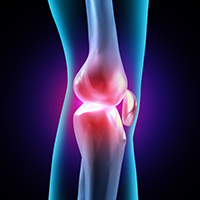Mechanical stress has been thought to be the main factor in the development of knee osteoarthritis. After all, osteoarthritis has been postulated to be a “wear and tear” disease. For that same reason, the association between obesity and knee osteoarthritis seems logical: the extra weight results in increased mechanical stress to the knee joint leading to the development of osteoarthritis. But, how do you explain that there is also a well documented association between hand osteoarthritis and obesity? That seems paradoxical, since the hands are obviously not under increased mechanical stress in overweight people.
It turns out that osteoarthritis is also a metabolic disease as explained here (http://www.ncbi.nlm.nih.gov/pubmed/24176735). Adipose tissue produces chemicals, proteins and hormones, that influence inflammation, glucose metabolism, and insulin resistance. Those chemicals induce a metabolic disturbance that also contribute to the development of osteoarthritis. A recent study from the Netherlands entitled “Rationale for weight loss in knee osteoarthritis” reviewed the medical records of 6,628 participants and looked at the association between osteaoarthritis of the knees and hands, body weight, and the metabolic syndrome. What researchers found was that at the knee, obesity seems to create a perfect storm of risk for osteoarthritis through the interaction between elevated proinflammatory chemicals (cytokines) and increased mechanical stress.
Bottom line: weight loss that reduces the biological effects of adipose tissue as well as the mechanical stress on cartilage can yield a twofold benefit for knee osteoarthritis.
To learn more about non-surgical alternatives to joint replacement surgeries go to: www.dontoperate.com .

